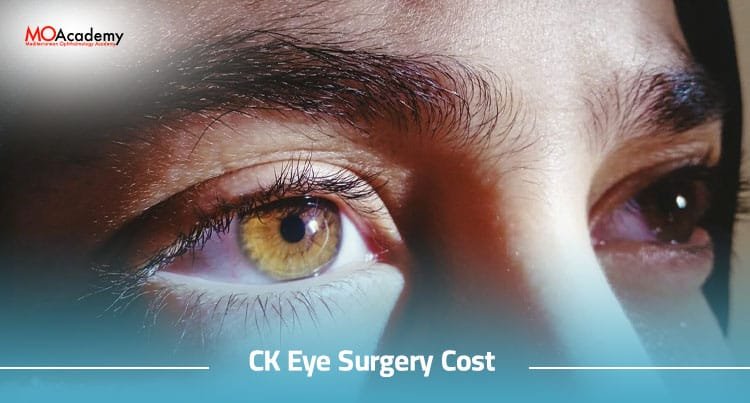CK Eye Surgery Cost
CK Eye Surgery Cost
Conductive Keratoplasty (CK) is a refractive eye surgery primarily used to correct
mild to moderate hyperopia (farsightedness) and presbyopia (age-related difficulty focusing on close objects).
The cost of CK surgery can vary depending on factors such as the geographic location,
the surgeon’s experience, the specific clinic or facility, and any additional services included in the package.
Surgeons may seek Conductive Keratoplasty (CK) eye surgery training for several reasons:
1- Expanding Practice Scope: Learning CK techniques allows surgeons to broaden
the range of refractive procedures they offer to patients.
By adding CK to their repertoire, surgeons can provide additional treatment options
for individuals with farsightedness (hyperopia) or presbyopia.
2- Meeting Patient Demand: Some patients may specifically seek out CK as a treatment
option for their refractive error or presbyopia.
3- Diversifying Skills: Surgeons who specialize in refractive surgery often seek to diversify
their skills to remain competitive in the field.
4- Clinical Flexibility: CK surgery can be particularly beneficial for patients who may not be suitable
candidates for other refractive procedures like LASIK or may prefer a less invasive option.
The cost of training for Conductive Keratoplasty (ck eye surgery cost ) surgery can vary depending
on several factors, such as the institution or program offering the training,
the duration and depth of the training, the location, and any additional materials or resources provided.
Formal training programs for CK surgery were often included as part of broader ophthalmology
residency or fellowship programs, which typically involve tuition fees and other associated costs.
The cost of such programs can vary widely depending on the institution and the specific curriculum.
For practicing ophthalmologists seeking additional training in CK surgery through continuing medical
education (CME) courses or workshops, the cost may be determined by factors such as course fees,
travel expenses, and accommodations.
It’s recommended to directly contact institutions, universities, or organizations offering CK
training programs or CME courses to inquire about specific costs and requirements.
Additionally, explore potential financial aid options or scholarships that may be available for medical
professionals pursuing advanced training.
CK Eye Surgery Cost (Conductive Keratoplasty Training Course)
Several factors can influence the surgeons training ck eye surgery cost
1- Institution or Program: The reputation, prestige, and location of the institution or program offering
the training can affect the cost. Training programs affiliated with renowned medical
schools or institutions may have higher tuition fees.
2- Duration and Depth of Training: Longer and more comprehensive training programs typically entail higher costs.
Short-term workshops or courses may be less expensive but may not provide as thorough an education.
3- Faculty Expertise: Training programs led by experienced and well-known ophthalmologists
may have higher fees due to the expertise of the instructors.
4- Facilities and Resources: Access to advanced surgical facilities, equipment,
and resources can contribute to the overall cost of the training program.
5- Hands-on Experience: Programs offering extensive hands-on experience with CK procedures
may have higher costs compared to those primarily focused on theoretical learning.
6- Accreditation and Certification: Accredited programs or those offering certification
may have higher fees due to the recognition and validation of their training.
7- Additional Materials and Resources: Any textbooks, materials, or resources provided
as part of the training program may factor into the overall cost.
8- Location: Training programs in metropolitan areas or regions with a higher cost of living
may have higher fees to cover operating expenses.
9- Travel and Accommodation: If the training program requires travel or accommodations,
these additional expenses should be considered.
10- Financial Aid and Scholarships: The availability of financial aid, scholarships,
or grants can significantly offset the cost of training for individuals who qualify.
When considering CK training programs, it’s essential to evaluate these factors comprehensively
and choose a program that aligns with your educational goals, budget, and career aspirations.
Additionally, researching reviews and testimonials from past participants can provide insights
into the quality and value of the training program.
specific standalone training courses solely dedicated to Conductive Keratoplasty (CK) surgery
may not be as prevalent as courses for more common refractive procedures like LASIK or PRK.
However, ophthalmologists interested in learning CK techniques can explore various avenues
to acquire the necessary skills and knowledge:
– Continuing Medical Education (CME) Courses: Look for CME courses or workshops
that include segments on CK surgery.
These courses may be offered by professional organizations, medical institutions,
or refractive surgery centers.
While CK-specific courses might be limited, broader courses covering refractive surgery
techniques may include CK as part of the curriculum.
– Ophthalmology Conferences and Symposia: Attend conferences, symposia,
and workshops focused on refractive surgery or corneal procedures.
These events often feature lectures, panel discussions, and hands-on workshops where CK techniques
may be taught by experts in the field.
– Industry-Sponsored Training Programs: Some medical device companies or manufacturers
of CK equipment may organize training programs or workshops for ophthalmologists
interested in incorporating CK into their practice.
These programs typically provide instruction on both the surgical technique and the use of specific CK devices.
– Preceptorships and Observerships: Seek out opportunities to observe experienced CK
surgeons in practice or participate in preceptorship programs where you can receive
one-on-one training and mentorship.
Establishing relationships with CK surgeons and learning directly from their experience can be invaluable.
– Online Resources and Webinars: Explore online resources, webinars, and educational
materials provided by reputable sources in the field of refractive surgery.
While these resources may not offer hands-on training, they can supplement your understanding of CK principles,
techniques, and patient selection criteria.
When searching for CK training opportunities, consider factors such as the reputation of the organizing institution,
the expertise of the instructors, the depth of the curriculum, and opportunities for hands-on learning.
Additionally, networking with colleagues and seeking mentorship from experienced CK surgeons
can further support your learning journey.

